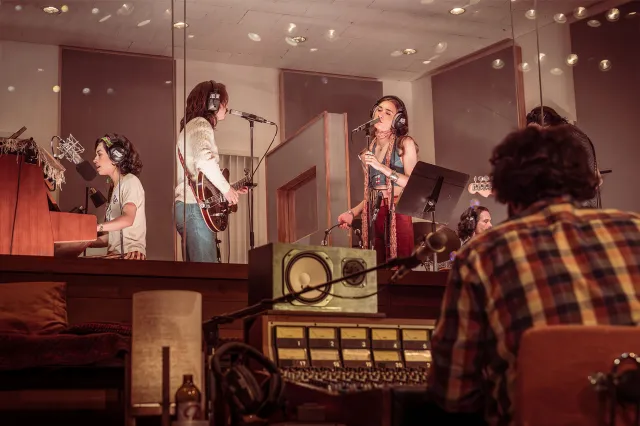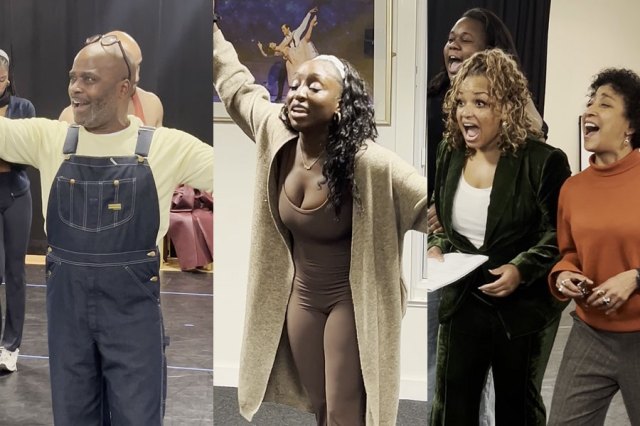Stereophonic West End review – a music studio masterpiece
The West End transfer of the hit Broadway play runs at the Duke of York’s Theatre until 11 October

Stereophonic arrives on the London stage with the resonance of a guitar classic. The ten-year journey of David Adjmi’s play from experimental theatre to Broadway, where it became the most Tony-nominated play of all time, is already the stuff of legend.
But so is the story it tells. Set in California over a single year from 1976-77, it takes a rock band of three men and two women, two couples and one drummer, two Americans and three Brits, and recounts what happens as they struggle to make their second album after the chart-topping success of their first. Any resemblance to Fleetwood Mac is entirely coincidental.
Animated by music by Will Butler (formerly of Arcade Fire), played and recorded live by the actors on stage, it’s a probing examination of what it means to make art, and why it matters that someone should. As the songs soar and lives collapse, it asks questions about relationships, the cost of things, and the value of seeking joy or giving in to despair. It is almost existential in its concerns, yet its overlapping, quickfire dialogue is both funny, pungent and entirely naturalistic. I think it is a masterpiece.
Its cleverness lies in the way that David Zinn’s set places the action entirely within the confines of a recording studio. Two sound engineers Grover (Eli Gelb) who has lied about working with The Eagles to get this gig and the almost silent Charlie (Andrew R Butler) sit at a sound desk at the front, surrounded by the detritus of late ’70s recording: cushions, drinks, a huge bag of cocaine.
Beyond them, behind a glass screen, is the booth where the band record. The atmosphere of the two spaces is different and their distinctions are defined by lighting by Jiyoun Chang that conjures the unreal sense of time in a place where it is always three in the morning. The separation of the stage allows different things to be seen – and heard – in different parts of the studio. Sometimes the sound is off while the engineers chat; sometimes they eavesdrop as people pour their hearts out.
Its evocation of what it is to be in a band is remarkably precise. One of the funniest sections surrounds the drummer and manager Simon (played with superb, watchful gravitas by Chris Stack) who is told by Grover that he has a rattle on his snare. The scene unfolds in half lines and silence as the rest of the band stand around waiting for it to be fixed. Gradually, Simon loses his cool and storms off. In the next scene, he is still fiddling with the drums behind the glass. His bandmates are sprawled around, chatting. “This is day six with the drums. I feel like we are going down a black hole,” says Grover.
The action is teased out slowly, over three hours. You can see where scenes could be cut. But this immersive detail, of something being made as you watch and listen, means that Stereophonic gradually accrues significance. Daniel Aukin’s gently controlled direction and the tautness of the writing, let the play’s significance shine in the gaps between the music. It doesn’t tell you about its characters; it shows you the effect of their personalities.
In this way, it becomes a meditation on human nature itself. In an extraordinary scene towards the end Grover, increasingly frazzled by the entire experience, and lead singer Diana (a heartfelt and beautifully sung performance by Lucy Karczewski) are talking about the year that has passed. “Don’t you think this was, kind of like, a nightmare?” he says. She looks at him in disbelief. “Honestly? This might just be the best thing that has ever happened to me.”
Each character changes in the course of the play, shifts subtly marked by Enver Chakartash’s costumes. Some things are refreshingly unexpected. Although Diana and Holly (Nia Towle) grow apart, they do not betray one another’s confidence, and Towle charts Holly’s emotional ups and downs with an open-hearted sensitivity that reveals both strength and terrible sadness. Zachary Hart’s bassist Reg, ricocheting between extreme alcoholic insensibility and tactless hopefulness, is wonderfully comic and gloriously chaotic. Jack Riddiford catches producer and guitarist Peter’s monstrous egoism, while suggesting that it springs from a damaged soul.
Gelb (one of the three imports with Stack and Butler from the original Broadway cast) turns Grover into a shambling figure of melancholy despair, always slightly behind every curve, while Butler makes his occasional interventions as the “Dobie cousin” Charlie some of the sharpest moments in the play. Though perhaps the most poignant is when Diana forgets his name.
As a production Stereophonic is full of radical decisions, reflected in the drama of Aukin’s staging which has the confidence, for example, to stage one crucial scene with a woman singing out from behind a brightly light booth, while three men sit, backs to the audience, watching her intently. Or to allow long periods of silence where people just watch one another’s reactions.
At the close, there is just the music, swirling out across the theatre, asking its own questions about the price of art, the value of love. It’s terrific.



















